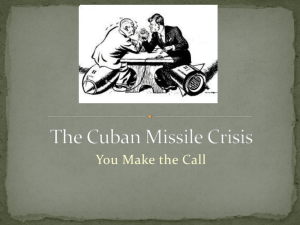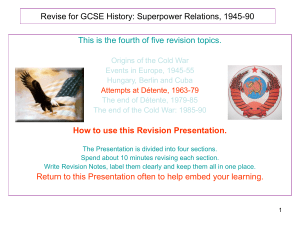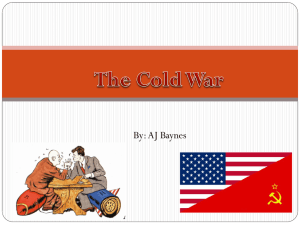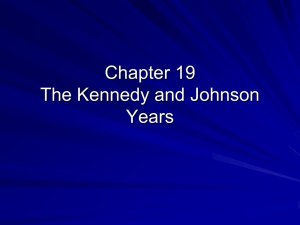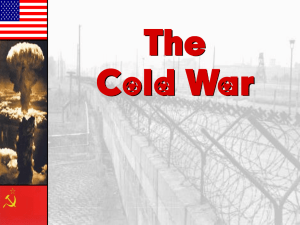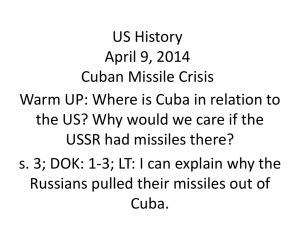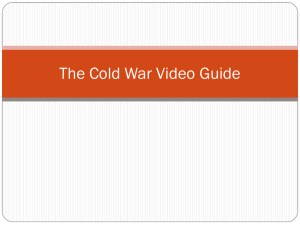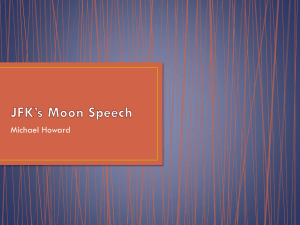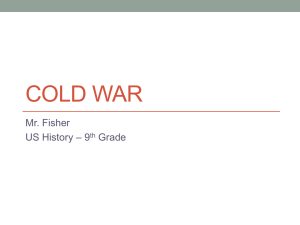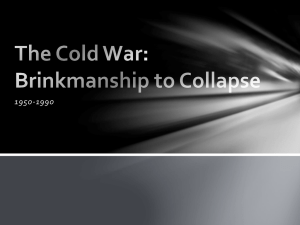Revise for GCSE Humanities: The 1950`s
advertisement
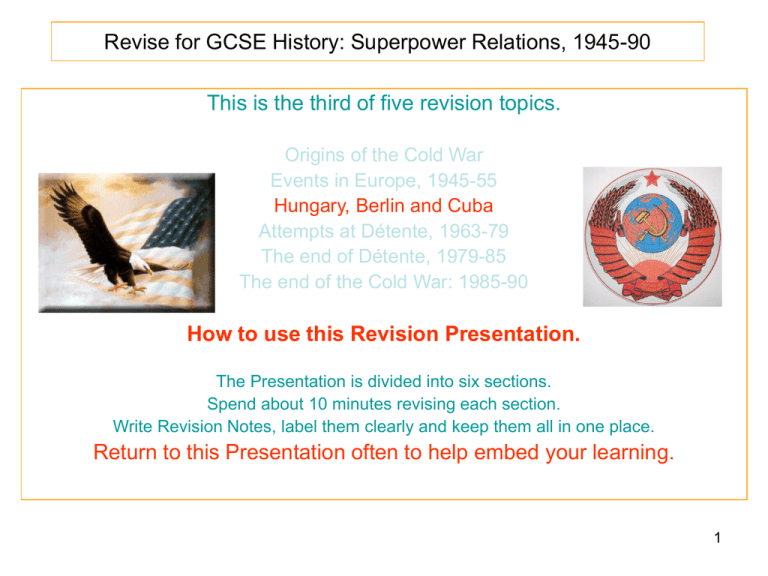
Revise for GCSE History: Superpower Relations, 1945-90 This is the third of five revision topics. Origins of the Cold War Events in Europe, 1945-55 Hungary, Berlin and Cuba Attempts at Détente, 1963-79 The end of Détente, 1979-85 The end of the Cold War: 1985-90 How to use this Revision Presentation. The Presentation is divided into six sections. Spend about 10 minutes revising each section. Write Revision Notes, label them clearly and keep them all in one place. Return to this Presentation often to help embed your learning. 1 Revise for GCSE History: Superpower Relations, 1945-90 There are six sections to this topic. Causes of the Hungarian Uprising Key features and results of the Hungarian Uprising Causes of the Berlin Crisis of 1961 Results of the Berlin Crisis Causes of the Cuban Missiles Crisis of 1962 Key Features and Results of the Missiles Crisis Spend about 10 minutes revising each section. Write Revision Notes, title them clearly and keep them all in one place. 2 Revise for GCSE History: Superpower Relations, 1945-90 Causes of the Hungarian Uprising Soviet invasion of Hungary Sept. 44. Allied Control Commission to administer. Soviets most influential. Agreed to pay $300m. reparations to Soviets. Nov 45 elections Smallholders Party 57%, Communists 17% . Voroshilov sets up a communist controlled coalition. Feb 47 opposition leaders arrested, communists win election. Rakosi becomes new leader, setting up a communist republic. Terror methods and purges used to maintain control. 200,000 political prisoners. Religion suppressed. Economy controlled through Comecon. Living standards fall. Rakosi unpopular. On the death of Stalin, Rakosi replaced by Imre Nagy. Nagy who wanted to get Hungary out of the Warsaw Pact. If Hungary were to leave the Warsaw Pact, it might collapse as other Satellites left. The Warsaw Pact would be weakened and possibly opened to attack. The Soviet Union’s prestige and security relied on controlling eastern Europe. Acting decisively over Hungary would strengthen Khrushchev’s position in the Soviet Union. Khrushchev needed to show the Chinese communists that he was not going soft on capitalism. 3 Revise for GCSE History: Superpower Relations, 1945-90 Key features and results of the Hungarian Uprising Oct. 56: demonstrations begin. Khrushchev sends tanks and troops to Budapest. Nagy becomes Prime Minister. Soviets withdraw tanks. US Sec. of State, Foster Dulles “You can count on us”. Ike unwilling to commit US. Nagy releases political prisoners and wants to leave Warsaw Pact. Nagy asks UN to mediate to reach a deal. New political parties emerge and Nagy sets up a coalition. Khrushchev scared of appearing weak by Soviet people and China. 4th Nov. 200k soviet troops and 6k tanks sent in. Hungarians use guerrilla tactics. 10th Nov. ceasefire. 1956 Suez Crisis preoccupies USA – so didn’t intervene in Hungary. Janos Kadov new leader. 4 Revise for GCSE History: Superpower Relations, 1945-90 Causes of the Berlin Crisis of 1961 1945 Berlin divided into 4 occupied zones. Soviet Union (SU) wanted western allies (WA) out – show of west’s prosperity. 1000s of Germans fled to West via Berlin due to: poverty caused by – forced collectivisation of farming, no private enterprise, shortage of consumer goods. SU claimed US and Allies using Berlin for spying. Khrushchev (KH) wanted West out of Berlin – to become a neutral city. Eisenhower (Ike) and KH to meet at Paris Summit 14 May 60. U2 US spy-plane shot down over SU – Gary Powers. KH demands apology – storms out. Ike cancels visit to Moscow. Jan 1961 – 20k refugees a month escape to west via Berlin. KH to meet JFK at Vienna Summit in June 61. KH believed he could dominate JFK. KH demanded withdrawal of western forces. JFK refused. KH closes border between East and West Berlin. Wire, then Wall began. 5 Revise for GCSE History: Superpower Relations, 1945-90 Results of the Berlin Crisis For Berliners: USSR had broken 1949 agreement, JFK had not gone to war to protect. Families divided, travel restrictions. For NK: had beaten JFK, stopped flow of refugees, had failed to remove West. For JFK: had failed to prevent Wall – “better a Wall than a War”. Wall became a symbol of the Cold War divisions. Unresolved issues led to the Cuban Missiles Crisis in 1962.. . 6 Revise for GCSE History: Superpower Relations, 1945-90 Causes of the Cuban Missiles Crisis of 1962 1959 Castro seizes power in Cuba, nationalises US owned businesses. USA retaliated by refusing to buy Cuban sugar. Soviet Union offered to buy the sugar and to provide machinery, oil and technology. Soviet involvement in Cuba 17 April 1961 CIA backed invasion at Bay of Pigs, by Cuban exiles. Failure. Sanctioned by Ike, but JFK takes the blame and is humiliated. Castro pushed towards Soviet Union and becomes a communist. Soviet military advisors sent to Cuba. Khrushchev hoped to spread communism into Latin America. Khrushchev concerned by US missile bases in Turkey. Soviet missile bases on Cuba would protected it from future attack and provide a “balance of power”. By September 1962 Soviet ballistic missiles were being installed on Cuba. Khrushchev viewed the missiles as defensive, unlike the US missiles in Turkey. 14th October US U2 spy-plane photographs the missiles. It was estimated that these IRBM would be able to reach most US cities. 7 Revise for GCSE History: Superpower Relations, 1945-90 Key Features of the Missiles Crisis JFK sets up EXCOMM – 12 advisers. 3 options – bomb Cuba with nuclear missiles, surgical air strike or do nothing. Naval quarantine, or exclusion zone set up. Polaris subs and ICBMs prepared. Military placed on alert. 22:10 JFK’s TV broadcast, 24:10 Soviet ships turn before reaching quarantine line. JFK demands removal of all missiles. 26:10 KH offers to remove missiles in return for promise not to invade. 27:10 KH promises to remove missiles if US missiles removed from Turkey. U2 spy plane shot down over Cuba. Crisis deepens. 28:10 JFK decided to ignore KH's first letter and to act on the second. KH accepts the offer. US agrees to remove missiles from Turkey, but only after Soviet missiles are removed from Cuba. 8 Revise for GCSE History: Superpower Relations, 1945-90 Results of the Missiles Crisis JFK appeared to have won, as Turkish missiles deal not made public and missiles removed from Cuba and KH forced to back down. KH criticised (USSR and China) for backing down. KH believed he had won as Cuba safe from invasion and Turkish missiles removed. KH sacked in 1964. International concerns re brinkmanship by JFK and KH. Reduction in tension. Hot Line telephone link between Moscow and Washington set up. Partial Test Ban Treaty (1963) stops atmospheric testing of weapons. 1966 France withdraws from NATO because JFK had not consulted enough. Nuclear Non-proliferation Treaty (1968) to stop spread of nuclear weapons – too late. 1969 arms reduction talks begin. US sells grain to USSR. 9
